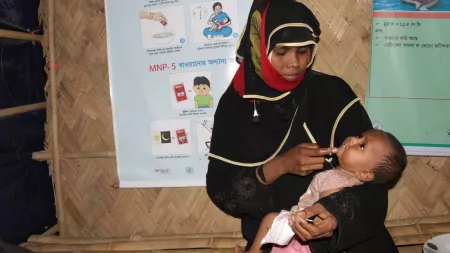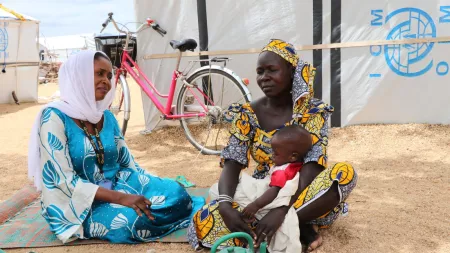How sexual and reproductive health and rights are affected in crises
Natural disasters, armed conflict, and political unrest increase the vulnerability of women and girls and create barriers to accessing reproductive and maternal health services.
60% of preventable maternal deaths take place in settings of conflict, displacement, and natural disasters. Without access to proper care, crises can increase the risks of sexually transmitted infections, unwanted pregnancy, and pregnancy-related complications that can lead to illness and death for mother and child.
The breakdown in social norms and protective structures increases girls and women’s exposure to gender-based violence (GBV) and its consequences. When facing an unwanted pregnancy, it is not uncommon for women to perform self-induced abortions, which may result in death without post-abortion care. Consequently, access to sexual and reproductive health services — including family planning, emergency obstetric and neonatal care, and gender-based violence services — is necessary for saving lives in these difficult contexts.
The scale of the COVID-19 pandemic means that financial resources are being diverted from existing health services to support responses to the pandemic. In some contexts, this may lead to a shortage of health professionals and medication to support critical SRHR services.
Reductions in SRHR services will have a greater effect on patients who rely on free or subsidized care, particularly women, girls, and/or other marginalized groups living in poverty and/or those already facing other barriers to SRHR health care.
What is CARE International doing to improve sexual and reproductive health during crises?
CARE International’s sexual and reproductive health and rights in emergencies programming has the following key aims to:
- Ensure people have access to essential lifesaving sexual and reproductive health interventions during an acute emergency. This includes working with communities and first responders before an emergency to prepare and plan for sexual and reproductive health services during an emergency response.
- Help people recover from crisis by rebuilding and strengthening local health systems to provide comprehensive sexual and reproductive health services.
CARE International and partners will work to:
- Enhance preparedness efforts on SRHR and public health in emergencies through capacity strengthening of governments, local partners, and other humanitarian actors.
- Enable agile, rights-based, people-centered, gender-sensitive emergency response efforts guided by the minimum, life-saving sexual and reproductive health needs that should be addressed at onset of an emergency.
- Support community-based approaches that increase access to critical information, combat rumors and stigma, and address barriers to access to essential services.
- Support transition to comprehensive SRHR services in fragile and conflict-affected settings by strengthening government health systems that have been weakened by crisis.
- Support locally led efforts to amplify voices, enhance accountability and shift power and resources to leaders, particularly women and adolescent girls.
- Enhance GBV integration, including clinical response to rape.
Strengthening access to family planning and post-abortion care in emergencies
Through the Strengthening Access to Family Planning and Post-Abortion Care in Emergencies (SAFPAC) program, CARE International works to reduce both unintended pregnancies and deaths from unsafe abortion in crisis-affected settings. The SAFPAC initiative meets people’s needs for family planning and post-abortion care services by strengthening health systems through clinical skills building, supply chain strengthening, and facility based, data-driven supportive supervision. Through facilitated dialogue, we also assist communities to challenge and change social norms.
Since 2011, SAFPAC has supported over 60,000 new users of modern family planning and over 26,000 post-abortion CARE clients.


